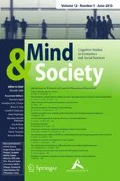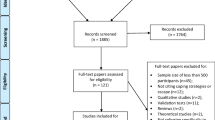Abstract
Reward attribute, i.e. long-term versus short-term reward, is the most commonly analyzed choice attribute in Iowa Gambling Task (IGT). The present study (n = 45) employs measures of individual differences to explore preferences in IGT choices, based on punishment attribute (frequent versus infrequent punishment) along with the reward attribute. Three questionnaires (rational-experiential information processing style, risk attitude, and maximization regret behavior) were employed to analyze whether preferences were based on reward or on punishment attribute of the IGT choices. The T test indicated a selective preference for punishment, but not for reward attribute. Pearson’s correlation revealed that rational information processing is associated with more choices from infrequent–large punishment decks. Regression analysis indicated that rational information processing, tendency to maximize-experience regret, and risk attitude accounted for selective preferences based on the punishment attribute. Measures employed were unrelated to reward attribute of the IGT choices. Results are explained in terms of choice preference for frequent but smaller magnitude versus infrequent but larger magnitude punishment in IGT.
Similar content being viewed by others
References
Bark R, Dieckmann S, Bogerts B, Northoff G (2005) Deficit in decision making in catatonic schizophrenia: an exploratory study. Psychiat Res 134:131–141
Bateman I, Dent S, Peters E, Slovic P, Starmer C (2006) The Affect Heuristic and the Attractiveness of Simple Gambles. Center for Decision Research and Experimental Economics (CeDEx) Discussion paper series, ISSN: 1749–3293
Bechara A, Damasio H (2002) Decision-making and addiction (part I): impaired activation of somatic states in substance dependent individuals when pondering decisions with negative future consequences. Neuropsychologia 40:1675–1689
Bechara A, Damasio A, Damasio H, Anderson S (1994) Insensitivity to future consequence following damage to human prefrontal cortex. Cognition 50:7–15
Bechara A, Tranel D, Damasio H (2000) Characterization of the decision making deficit of patients with ventromedial prefrontal cortex lesions. Brain 123:2189–2202
Cohen M, Ranganath C (2005) Behavioral and neural predictors of upcoming decisions. Cogn Affect Behav Ne 5(2):117–126
Crone E, Vendel I, Van der Molen M (2003) Decision making in disinhibited adolescents and adults: insensitivity to future consequences or driven by immediate reward? Pers Indiv Differ 35:1625–1641
Crone E, Bunge S, Latenstein H, Van der Molen M (2005) Charaterization of children’s decision making: sensitivity to punishment frequency, not task complexity. Child Neuropsychol 11:245–263
Damasio A (1994) Descartes error. Macmillan, London
Davis C, Patte K, Tweed S, Curtis C (2007) Personality traits associated with decision making deficits. Pers Indiv Differ 42:279–290
Dunn B, Dalgleish T, Lawrence A (2006) The somatic marker hypothesis: a critical review. Neurosci and Biobehav R 30:239–271
Epstein S (1983) The unconscious, the preconscious and the self-concept. In: Suls J, Greenwald A (eds) Psychological perspectives on the self Hillsdale, vol 2. Erlbaum, NJ, pp 219–247
Epstein S (2003) Cognitive-experiential self-theory of personality. In: Millon T, Lerner MJ (eds) Comprehensive handbook of psychology, vol 5: personality and social psychology. Wiley, Hoboken, NJ, pp 159–184
Epstein S, Pacini R, Denes-Raj V, Heier H (1996) Individual differences in intuitive-experiential and analytical-rational thinking styles. J Pers Soc Psychol 71:390–405
Fernie G, Tunney RJ (2006) Some decks are better than others: the effect of reinforcer type and task instructions on learning in the Iowa Gambling Task. Brain Cogn 60:94–102
Fishbein D, Eldreth D, Matochik J, Isenberg I, Hyde C, London E (2005) Cognitive performance and autonomic reactivity in abstinent drug abusers and nonusers. Exp Clin Psychopharm 13(1):25–40
Franken I, Muris P (2005) Individual differences in decision making. Pers Indiv Differ 39:991–998
Fukui H, Murai T, Fukuyama H, Hayashi T, Hanakawa T (2005) Functional activity related to risk anticipation during performance of the Iowa gambling task. NeuroImage 24:253–259
Gray J (1987) The psychology of fear and stress. University Press, Cambridge
Lin C, Chiu Y, Lee P, Hsieh J (2007) Is deck B a disadvantageous deck in the Iowa Gambling Task? Behav Brain Funct 3:16
Loewenstein G, Prelec D (1992) Anomalies in intertemporal choice: Evidence and an interpretation. Q J Econ 107(2):573–597
Loewenstein G, Weber E, Hsee C, Welch N (2001) Risk as a feelings. Psychol Bull 127:267–286
MacPherson S, Phillips L, Della Sala S (2002) Age, executive function, and social decision making: a dorsolateral prefrontal theory of cognitive aging. Psychol Aging 17(4):598–609
Norris P, Epstein S (2003) Objective and subjective correlates of an extension of the rational-experiential inventory (Unpublished study)
Overman W, Frassrand K, Ansel S, Trawalter S, Bies B, Redmond A (2004) Performance on the IOWA card task by adolescents and adults. Neuropsychologia 42:1838–1851
Pacini R, Epstein S (1999) The relation of rational and experiential information processing styles to personality, basic beliefs, and the ratio-bias phenomenon. J Pers Soc Psychol 76:972–987
Peters E, Slovic P (2000) The springs of action: affective and analytical information processing in choice. Person Soc Psychol B 26(12):1465–1475
Ritter L, Meador-Woodruff J, Dalack G (2004) Neurocognitive measures of prefrontal cortical dysfunction in schizophrenia. Schizophrenia Res 68:65–73
Schwartz B (2000) Self determination: the tyranny of freedom. Am Psychol 55:79–88
Schwartz B, Ward A, Monterosso J, Lyubomirsky S, White K, Lehman D (2002) Maximizing versus satisficing: happiness is a matter of choice. J Pers Soc Psychol 83:1178–1197
Shiloh S, Salton E, Sharabi D (2002) Individual differences in rational and intuitive thinking styles as predictors of heuristic responses and framing effects. Pers Indiv Differ 32(3):415–429
Shiloh S, Shenhav-Sheffer M (2004) Structure of difficulties in mate-selection decisions and its relation to rational and intuitive cognitive styles. Pers Indiv Differ 37:259–273
Shurman B, Horan W, Nuechterlein K (2005) Schizophrenia patients demonstrate a distinctive pattern of decision-making impairment on the Iowa Gambling Task. Schizophrenia Res 72(2–3):215–224
Simon H (1955) A behavioral model of rational choice. Q J Econ 59:99–118
Suhr J, Tsanadis J (2007) Affect and personality correlated of Iowa gambling Task. Pers Indiv Differ 43:27–36
Tomb I, Hauser M, Deldin P, Caramazza A (2002) Do somatic markers mediate decisions on gambling task. Nat Neurosci 5:1103–1104
Toplak M, Jain U, Tannock R (2005) Executive and motivational processes in adolescents with attention-deficit-hyperactivity disorder (ADHD). Behav Brain Funct 1(1):8
van Honk J, Hermans E, Putman P, Montagne B, Schutter D (2002) Defective somatic markers in sub-clinical psychopathy. Neuroreport 13:1025–1027
van den Bos R, Houx B, Spruijt B (2006) The effect of reward magnitude differences on choosing disadvantageous decks in the Iowa Gambling Task. Biol Psychol 71(2):155–161
Weber E, Blais A, Betz N (2002) A domain-specific risk-attitude scale: measuring risk perceptions and risk behaviors. J Behav Decis Making 15:263–290
Wilder K, Weinberger D, Goldberg T (1998) Operant conditioning and the orbitofrontal cortex in schizophrenic patients: unexpected evidence for intact functioning. Schizophrenia Res 30:169–174
Author information
Authors and Affiliations
Corresponding author
Appendix
Appendix
Rights and permissions
About this article
Cite this article
Singh, V., Khan, A. Heterogeneity in choices on Iowa Gambling Task: preference for infrequent–high magnitude punishment. Mind Soc 8, 43–57 (2009). https://doi.org/10.1007/s11299-008-0050-1
Received:
Accepted:
Published:
Issue Date:
DOI: https://doi.org/10.1007/s11299-008-0050-1



